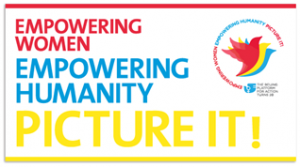Review of India’s progress in the last 20 years on Beijing Platform for Action’s 12 critical areas of concern.
Date:
Women’s movements, CSOs, and UN Women converge to analyse status of women in the country and call for a recommitment to gender equality and women’s empowerment
Review of India’s progress in the last 20 years on Beijing Platform for Action’s 12 critical areas of concern
New Delhi, August 11, 2014 – In 1995, over 17,000 participants, 30,000 activists and representatives from 189 governments, including over 500 delegates from India, congregated at the historic Fourth World Conference on Women in Beijing, China and developed a progressive yet practical framework for achieving gender equality. The Beijing Declaration and Platform for Action (BPfA) sparked intense gender equality efforts across India and around the world. Twenty years later the world is reviewing the progress made on gender equality and women’s empowerment. As part of this process Civil Society Organisations in India are coming together in New Delhi on 11 and 12 August, to participate in the Beijing+20 India CSO National Consultation, supported by UN Women.
UN Women is leading and supporting the Beijing+20 review process in India and globally.
“UN Women is the lead convener on gender equality and women’s empowerment within the United Nations system. We have the mandate to strengthen the norms, frameworks and policies that promote gender equality and the obligation to create the necessary impetus to see them implemented. Women’s groups and the civil society are our some of our strongest partners and so we collaborate with them for the Beijing+20 political and social mobilization efforts. The goal is to strengthen the gender equality agenda through civil society participation in India and across the world, and strengthen resource contribution to it,” says Ms. Lopa Banerjee, Chief of Civil Society Section, UN Women.
The Beijing+20 India CSO national consultation is a vibrant convergence of India’s key civil society organisations and will discuss future actions, challenges and opportunities for women’s movements in the country, in addition to reviewing the implementation of the BPfA in the last 20 years. The consultation will input into major global processes, which will help to deconstruct and strategise for more effective gender equality interventions in the near-future.
“The Beijing+20 campaign is aptly called ‘Empowering Women, Empowering Humanity, Picture it!’ – we would like to re-energise the women’s rights movement, reinstate commitment to gender equality goals, give gender inequality an expiration date and inspire people to imagine a world where women have equal rights, and have realised their full potential. India remains a complex and a pivotal country for gender equality work and meetings such as these help to acknowledge successes, identify challenges, and formulate effective solutions that can be implemented in India and beyond. The outputs of the India national consultation will be used to inform the Asia-Pacific regional Beijing+20 review and subsequently the 59th Session of the Commission on the Status of Women at New York in March 2015,” says Dr. Rebecca Tavares, Representation, UN Women Office for India, Bhutan, Maldives & Sri Lanka.

The consultation includes powerful debates and panels on the Beijing+20 process, freedom from violence, women’s security, resources and capabilities, voice and agency, macroeconomic policy and women’s rights, in addition to special multi-stakeholder sessions on inter-generational solidarity, Convention on the Elimination of All forms of Discrimination against Women (CEDAW), interaction with parliamentarians to incorporate political perspective into the Beijing agenda, and collaborative sessions that will deliberate on the BPfA’s 12 critical areas of concern:
|
“As we celebrate the 20th anniversary of BPfA, and review the implementation of the commitments, it’s time to call for ‘accountability’ and ‘political will’ to realise those commitments. What has changed for women and girls in India since 1995? There have been some gains but the progress on the whole is uneven. Inequities persist and women suffer in all spheres, namely violence, feminisation of poverty, the feminisation of labour, vulnerability of marginalised, continued gender blindness of macroeconomic policy, denial of equal participation in decision making bodies etc. As we move forward towards transformative and inclusive goal of gender equality in every sphere, it is time to renew call for strong political leadership and inking of a new contract with the half of the population. Words are good but action is better,” concludes Dr. Pam Rajput, Chairperson, Beijing+20 CSO/CSAG Working Group.
CSOs, individuals and the general public can contribute to the Beijing+20 India CSO national consultation discussions on twitter using #Beijing20India.
NOTES TO EDITORS:
UN Women is the UN organization dedicated to gender equality and the empowerment of women. For more information, visit www.unwomenindia.org
For more details, please contact:
UN Women: Bina Emanvel; [ Click to reveal ]; +918130981081